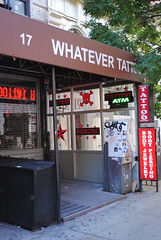 Tania Barnes The owners of Whatever Tattoos, at 17 St. Marks Place, installed new, energy-efficient bulbs in April.
Tania Barnes The owners of Whatever Tattoos, at 17 St. Marks Place, installed new, energy-efficient bulbs in April.A push by Con Edison to reduce energy consumption across the city is placing a special emphasis on the East Village.
The Avenue A Project is a program sponsored by the utility that offers local businesses free energy-efficient bulbs and other upgrades to reduce power usage. But, according to Con Ed officials, the response so far has been less than stellar.
In 2008, Con Ed asked energy consultants with Comverge Inc. to help reduce power consumption in the neighborhood by about 5 megawatts by 2012. That’s roughly equivalent to the energy that would be used if a 60-watt incandescent light bulb were placed in every seat at the New Meadowlands Stadium.
Despite such inducements as the lightbulbs and upgrades to heating and cooling systems, local businesses have mostly deflected the overtures of consultants. After two years, Comverge has managed to shave off 1.4 megawatts of power usage in the area.
Washington Teran, a consultant with Comverge, attributed the unenthusiastic response to mistrust by some business owners.
“It’s a lot of rejection,” Mr. Teran said, describing his efforts to canvass the neighborhood. “People think it’s too good to be true.”
The benefits of the program seem appealing: the on-site assessment is free, as is, in most cases, the upgrade. Con Ed usually covers 100 percent of the costs for the energy-saving light bulbs and their installation. Businesses can pick and choose the upgrades that they want and there are savings down the line in the form of reduced energy costs — as much as $12,000 a year for some businesses, according to Mr. Teran.
Yet the reaction to the effort has been tepid at best. Mr. Teran recalled the time when a business owner on St. Marks Place threw him out of a shop. “He said – ‘It’s a scam,’” Mr. Teran recalled.
Prakash Deshpande, the owner of Avec Pharmacy on Avenue C, admitted to being skeptical – but not about Con Ed.
“I don’t trust the contractors,” Mr. Deshpande said. “I don’t want to work with them. I want to deal directly with Con Ed.”
Mr. Deshpande had contacted Con Ed recently about reducing his energy costs, but said he waited two weeks to hear back. Meanwhile, he ignores calls from Comverge.
Chris Olert, a Con Ed spokesman, said that 638 businesses in the area have made the switch to such energy-saving measures as the new bulbs – and many are satisfied.
The owners of Whatever Tattoo, on St. Marks Place near Third Avenue, had energy-saving light bulbs installed, at no charge, in April.
“We haven’t had to change a single bulb,” said Tino Tolentino, the manager at Whatever.
Mr. Tolentino added that the change has also had an unexpected benefit: The light bulbs also emit less heat so the tattoo artists no longer sweat on customers. “Oh yeah, they’re happy,” Mr. Tolentino said of Whatever’s customers.
The Avenue A Project – named for the substation located there – is part of a $50 million effort called Clean Energy Network NY designed to reduce energy consumption in Westchester County and in Manhattan below 34th Street. Extra money, however, has been earmarked for the area from 14th Street to Canal and Market Streets and Broadway to the East River.
That’s because the East Village is a “real hotspot,” according Mr. Teran, where the load on the electric grid is much more than the outdated infrastructure can handle.
In the areas of the city with a longer commercial history than the East Village, Con Ed was able to install more circuits underground in the 1960s.
Today it is more difficult to get permits from the city for that kind of construction, which is costly and disruptive. Mr. Olert said that the utility hopes that by reducing consumption it can avoid – or at least delay – ripping up the ground to install more copper circuits.
Anjie Cho is a project manager at the Lower East Side ecology center who has worked with Comverge to outfit local businesses in the East Village and Lower East Side with greener energy. She agreed that it can be hard to persuade businesses to go green.
“Small business owners are really busy,” Ms. Cho said. “And people are naturally skeptical.” She likened it to when someone asks you on the street where you get your haircut. “Your immediate reaction is to say you’re not interested.”
It’s harder for Comverge, too, she said. “We’re a non-profit, people are more likely to trust us,” Ms. Cho said. “People don’t want to deal with ‘the man.’” She theorized that some business owners may wonder: “Why is Con Ed doing this?”



